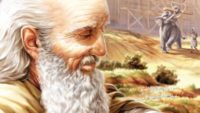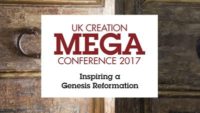By Dr. Greg Hall Parents and students who are looking ahead to college should be humbled by the magnitude of the decision and implications that it will have on their life. …read more Read more here: AIG Daily
By Multimedia On this episode of ID the Future, Andrew McDiarmid interviews Paul Nelson on the upcoming Royal Society conference he will be attending, New trends in evolutionary biology: biological, philosophical and social science perspectives. Nelson shares about his expectations for the controversial gathering. Your browser does not support playing Audio, please upgrade your browser or find our podcast on podOmatic Download Episode …read more Read more here: id the future
By Ken Ham Every year, the Creation Museum is pleased to host a free College Expo where students and their families can meet representatives from many creationist, Bible-upholding colleges, universities, and seminaries, in one convenient location. Attendees will also hear from AiG scientists and have the opportunity to win a $500 scholarship. With the increasing erosion of biblical authority even within most Christian colleges, it’s never been more important for your student to attend a college that stands firmly on the Word of God. We’ve been diligent to make sure that all of the institutions at the College Expo hold [More]
By Ken Ham Have you ever wondered what life was like for Noah before God called him to build the Ark (Genesis 6:13–14)? What was it like to live as a righteous man in a culture that thought of evil continually (verse 5)? Well, AiG’s Tim Chaffey and K. Marie Adams explore these and other questions in their new novel, Noah: Man of Destiny. If you’ve had the chance to enjoy the “Who Was Noah?” exhibit at the Ark Encounter in Northern Kentucky, you’re sure to enjoy this novel. For that exhibit, Tim Chaffey, the Ark’s content manager, was responsible [More]
Was ancient man’s fascination with painting images on cave walls a precursor to cinematography? …read more Read more here: creation.com
By Creation Moments From 1961 to 1972, the Apollo space program captured the world’s attention with its 11 manned flights into space, its tragedies and its triumphs. Though the program is best remembered for the failed mission of Apollo 13, NASA succeeded beyond measure when it landed a man on the moon in 1969. read more …read more Read more here: Creation Moments
By Bodie Hodge When did Halloween begin and why? How should Christians view this day in general? To understand, we need to go back to the roots of Halloween. …read more Read more here: AIG Daily
By Ken Ham A recent discovery in the city of Lachish, Israel, has brought attention to the specific details recorded in Scripture about the desecration of shrines to Baal. One king of Israel (Jehu) and one king of Judah (Hezekiah) are spoken of in 2 Kings in reference to destroying pagan shrines. And they brought the sacred pillars out of the temple of Baal and burned them. Then they broke down the sacred pillar of Baal, and tore down the temple of Baal and made it a refuse dump to this day. Thus Jehu destroyed Baal from Israel (2 Kings [More]
By Creation Moments Ever wonder why habits are so hard to break? If you think it’s just a matter of weak willpower or cravings that refuse to subside, scientists from Duke University have startling news for you. They have found that habits leave a lasting mark on specific circuits in the brain, priming you to keep engaging in the habitual activities. read more …read more Read more here: Creation Moments
By Tony Perkins God’s Word is our guide in all areas of faith and practice, even in politics. …read more Read more here: AIG Daily
Understanding the difference between what opposing theories predict helps to discriminate between them and thus avoid useless arguments. …read more Read more here: creation.com
How did dinosaurs go extinct? Did they live alongside humans? ICR science writer Brian Thomas reveals the biblical and scientific evidence in this podcast series. Listen to fascinating insights from the fossil record, biblical history, and recent soft-tissue discoveries. More… …read more Read more here: icr.org
By Creation Moments On our previous Creation Moments broadcast, we had good news for coffee drinkers – specifically, that the caffeine in coffee does not make a person dehydrated. The long-held myth that coffee is a diuretic was the product of 90-years-old bad science. Well, today we’ve got even more good news about something you might already be consuming at breakfast. Once you hear how feeding it to laboratory mice improved their learning ability, you might want to make it a regular part of your family’s breakfast. read more …read more Read more here: Creation Moments
By Ken Ham In days gone by, the United Kingdom was known for sending missionaries around the world. Now, the UK is a mission field. Sadly, Christianity has been on the decline across the UK, and reaching people with the good news of the gospel is difficult. If you are a Christian in the UK (or even in continental Europe), are you prepared to share the gospel in an increasingly secular culture? Well, you are invited to get equipped by joining me next year for a mega conference October 26–28, 2017, in West Bromwich, West Midlands, UK. This conference will [More]
Are Genesis 1 and 2 separate creation accounts? And does the Bible forbid eating rare steak? …read more Read more here: creation.com
A missionary speaks passionately of how Genesis proves crucial in giving hope despite an alarming social decay in Fiji. …read more Read more here: creation.com
By Creation Moments Ask evolutionists what they consider to be the single most important evidence for Darwinism, and you’ll hear them give many different answers. But the one answer we hear most often is: “the fossil record.” read more …read more Read more here: Creation Moments
If you desire to help Answers in Genesis further the biblical authority ministry, consider the charitable life insurance options explored in this article. …read more Read more here: AIG Daily
Learn how to defend the value of human life from a biblical creation foundation. …read more Read more here: creation.com
By Multimedia On this episode of ID the Future, Stephen Meyer continues to discuss Darwin’s Doubt with Tom Woodward on The Universe Next Door. Meyer addresses paleontologist Charles Marshall’s critical review of Darwin’s Doubt, and why natural selection acting on random mutations can’t account for a huge infusion of new information in the Cambrian explosion. Your browser does not support playing Audio, please upgrade your browser or find our podcast on podOmatic Download Episode …read more Read more here: id the future
By Multimedia On this episode of ID the Future, Ray Bohlin interviews Michael Behe about irreducible complexity and evolution. Despite claims at the publishing of the book that in the coming years science would discover how molecular machines evolved, Behe notes that Darwinists have made no progress in explaining irreducible complexity. Your browser does not support playing Audio, please upgrade your browser or find our podcast on podOmatic Download Episode …read more Read more here: id the future
By Ken Ham On Saturday, I had the privilege of welcoming Conor Daly, the 24-year-old Indy racecar driver to the Ark Encounter, located south of Cincinnati. Conor has competed in three Indy 500s and has raced all across America and Canada, finishing in the top six in several races. The last time we saw Conor was at the Indy 500 in May, racing with the Ark Encounter logo on his car and his racing suit. Conor Daly at the Indy 500. On Saturday, he parked his Indy car (a show car) at the bow end of the Ark where he [More]
The Ancient Man exhibit on the Ark’s third deck was designed to show that our early predecessors were much brighter than commonly depicted. …read more Read more here: AIG Daily
By Creation Moments Dr. John Long, Paleontologist and Head of Science at the Museum Victoria in Melbourne, Australia, should know a lot about fish … and he does. But even though he wrote a book about the evolution of fish, there are many things he readily admits remain shrouded in mystery. read more …read more Read more here: Creation Moments
By Ken Ham Hundreds of guests joined us in the stern of the Ark Encounter recently for the premiere of Living Waters’ newest film, The Atheist Delusion. …read more Read more here: AIG Daily
Doubts and doubters deserve the same sort of scrutiny they cause us to give to our faith. …read more Read more here: creation.com
How hearing a creation message helped inspire a young man and transform his theology. …read more Read more here: creation.com


















![Thank God, I Am Free [Live] Thank God, I Am Free [Live]](http://img.youtube.com/vi/12diisuQBhA/0.jpg)













![Dinosaurs and the Bible [Podcast] Dinosaurs and the Bible [Podcast]](http://proofthebibleistrue.com/wp-content/uploads/2016/10/66664-thumb-200x124.jpg)









